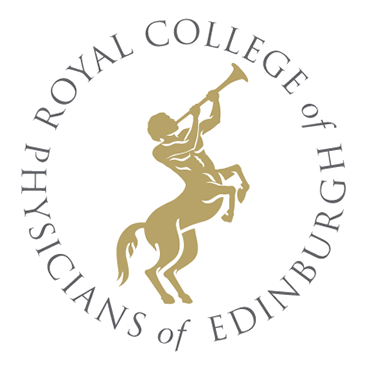
The Consultation Letters of Dr William Cullen (1710-1790) at the Royal College of Physicians of Edinburgh
[ID:894] From: Dr John Alves / To: Dr William Cullen (Professor Cullen) / Regarding: Anonymous (Patient) / 24 March 1774 / (Incoming)
Letter from John Alves regarding an unnamed male patient whose condition is improving following Cullen's diagnosis and directions.
- Facsimile
- Normalized Text
- Diplomatic Text
- Metadata
- Case
- People
- Places
Facsimile
There are 4 images for this document.
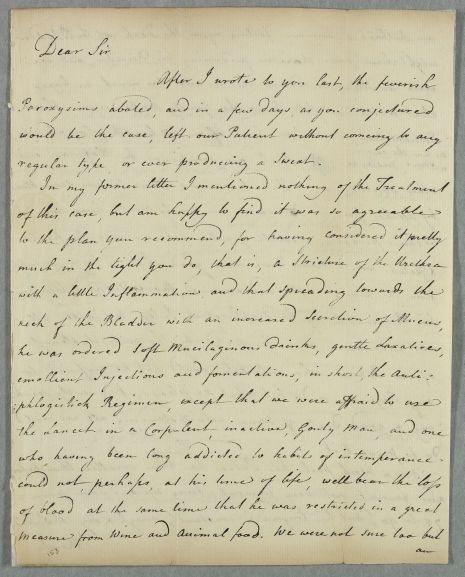
[Page 1]
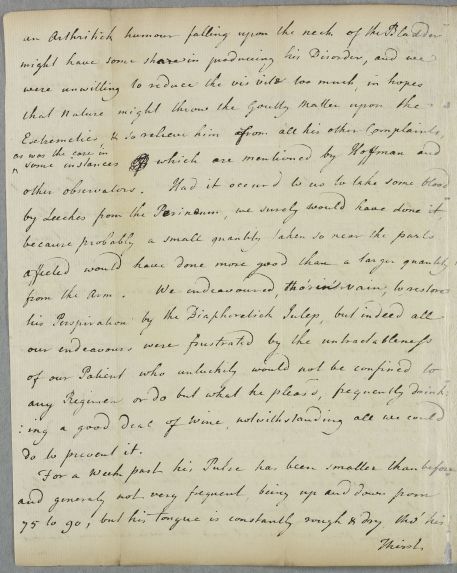
[Page 2]
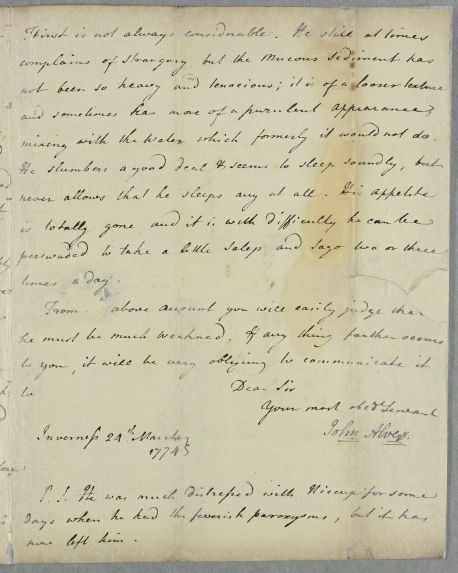
[Page 3]
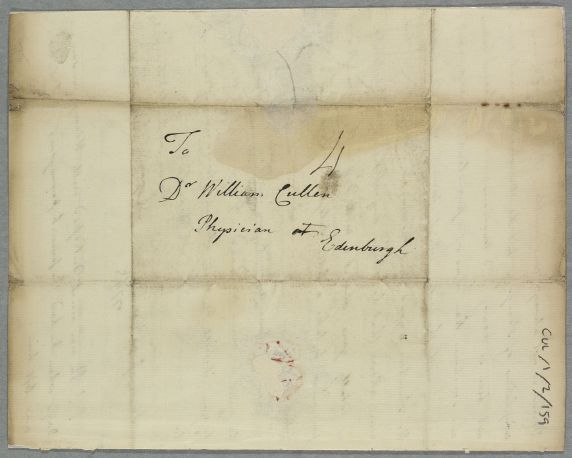
[Page 4]
Metadata
| Field | Data |
|---|---|
| DOC ID | 894 |
| RCPE Catalogue Number | CUL/1/2/159 |
| Main Language | English |
| Document Direction | Incoming |
| Date | 24 March 1774 |
| Annotation | None |
| Type | Authorial original |
| Enclosure(s) | No enclosure(s) |
| Autopsy | No |
| Recipe | No |
| Regimen | No |
| Letter of Introduction | No |
| Case Note | No |
| Summary | Letter from John Alves regarding an unnamed male patient whose condition is improving following Cullen's diagnosis and directions. |
| Manuscript Incomplete? | No |
| Evidence of Commercial Posting | Yes |
Case
Cases that this document belongs to:
| Case ID | Description | Num Docs |
|---|---|---|
| [Case ID:188] |
Case of an unnamed male patient aged sixty - who had a career in the military - 'troubled with gouty complaints' and 'subject to Strangury the Consequence of Gonorrhea Viruleuta...'. |
2 |
People linked to this document
| Person ID | Role in document | Person |
|---|---|---|
| [PERS ID:148] | Author | Dr John Alves |
| [PERS ID:1] | Addressee | Dr William Cullen (Professor Cullen) |
| [PERS ID:559] | Patient | |
| [PERS ID:148] | Patient's Physician / Surgeon / Apothecary | Dr John Alves |
| [PERS ID:2872] | Other Physician / Surgeon | Dr Friedrich Hoffmann (Hoffman) |
Places linked to this document
| Role in document | Specific Place | Settlements / Areas | Region | Country | Global Region | Confidence |
|---|---|---|---|---|---|---|
| Place of Writing | Inverness | North Highlands | Scotland | Europe | certain | |
| Destination of Letter | Edinburgh | Edinburgh and East | Scotland | Europe | certain |
Normalized Text
After I wrote to you last, the feverish
Paroxysims abated, and in a few days, as you conjectured
would be the case, left our Patient without coming to any
regular type, or ever producing a sweat.
In my former letter I mentioned nothing of the Treatment
of this case, but am happy to find it was so agreeable
to the plan you recommend, for having considered it pretty
much in the light you do, that is, a stricture of the Urethra
with a little Inflammation and that spreading towards the
neck of the Bladder with an increased secretion of Mucus,
he was ordered soft mucilaginous drinks, gentle Laxatives,
emollient Injections and fomentations, in short, the anti¬
phlogistick Regimen, except that we were affraid to use
the Lancet in a Corpulent, inactive, Gouty man, and one
who having been long addicted to habits of intemperance
could not, perhaps, at his time of life, well bear the loss
of blood at the same time that he was restricted in a great
measure from wine and animal food. We were not sure too but
[Page 2]
an Arthritick humour falling upon the neck of the Bladder
might have some show in producing his Disorder, and we
were unwilling to reduce the vis vitæ too much, in hopes
that nature might throw the Gouty matter upon the
Extremeties, & so relieve him from all his other Complaints,
↑as was the case in↑ some instances of which are mentioned by Hoffman 1
other observations. Had it occurd to us to take some blood
by Leeches from the Perineum, we surely would have done it,
because probably a small quantity taken so near the parts
affected would have done more good than a larger quantity
from the Arm. We endeavoured, tho' in vain, to restore
his Perspiration by the Diaphoretick Julep, but indeed all
our endeavours were frustrated by the untractableness
of our Patient who unluckily would not be confined to
any Regimen or do but what he pleas's, frequently drink¬
ing a good deal of wine, notwithstanding all we could
do to prevent it.
For a week past his Pulse has been smaller than before
and generaly not very frequent, being up and down from
75 to 90, but his tongue is constantly rough & dry tho' his
[Page 3]
Thirst is not always considerable. He still at times
complains of Strangury, but the mucous sediment has
not been so heavy and tenacious; it is of a looser texture
and sometimes has more of a purulent appearance
mixing with the water which formerly it would not do.
He slumbers a good deal & seems to sleep soundly, but
never allows that he sleeps any at all. His appetite
is totally gone and it is with difficulty he can be
perswaded to take a little salep and sago two or three
times a day.
From {illeg} above account you will easily judge that
he must be much weakned. If any thing farther occurs
to you, it will be very obliging to communicate it
to
Dear Sir
Your most obedient servant
Inverness, 24th March
1774
P.S. He was much distressed with Hiccup for some
days when he had thefeverish Paroxysims, but it has
now left him.
[Page 4]
To
Dr William Cullen
Physician at Edinburgh
Notes:
1: The works of the German chemist and physician Freidrich Hoffmann (Hoffman) (1660-1742), are too numerous to readily trace this specific reference.
Diplomatic Text
After I wrote to you last, the feverish
Paroxysims abated, and in a few days, as you conjectured
would be the case, left our Patient without coming to any
regular type, or ever producing a sweat.
In my former letter I mentioned nothing of the Treatment
of this case, but am happy to find it was so agreeable
to the plan you recommend, for having considered it pretty
much in the light you do, that is, a stricture of the Urethra
with a little Inflammation and that spreading towards the
neck of the Bladder with an increased secretion of Mucus,
he was ordered soft mucilaginous drinks, gentle Laxatives,
emollient Injections and fomentations, in short, the anti¬
phlogistick Regimen, except that we were affraid to use
the Lancet in a Corpulent, inactive, Gouty man, and one
who having been long addicted to habits of intemperance
could not, perhaps, at his time of life, well bear the loss
of blood at the same time that he was restricted in a great
measure from wine and animal food. We were not sure too but
[Page 2]
an Arthritick humour falling upon the neck of the Bladder
might have some show in producing his Disorder, and we
were unwilling to reduce the vis vitæ too much, in hopes
that nature might throw the Gouty matter upon the
Extremeties, & so relieve him from all his other Complaints,
↑as was the case in↑ some instances of which are mentioned by Hoffman 1
other observations. Had it occurd to us to take some blood
by Leeches from the Perineum, we surely would have done it,
because probably a small quantity taken so near the parts
affected would have done more good than a larger quantity
from the Arm. We endeavoured, tho' in vain, to restore
his Perspiration by the Diaphoretick Julep, but indeed all
our endeavours were frustrated by the untractableness
of our Patient who unluckily would not be confined to
any Regimen or do but what he pleas's, frequently drink¬
ing a good deal of wine, notwithstanding all we could
do to prevent it.
For a week past his Pulse has been smaller than before
and generaly not very frequent, being up and down from
75 to 90, but his tongue is constantly rough & dry tho' his
[Page 3]
Thirst is not always considerable. He still at times
complains of Strangury, but the mucous sediment has
not been so heavy and tenacious; it is of a looser texture
and sometimes has more of a purulent appearance
mixing with the water which formerly it would not do.
He slumbers a good deal & seems to sleep soundly, but
never allows that he sleeps any at all. His appetite
is totally gone and it is with difficulty he can be
perswaded to take a little salep and sago two or three
times a day.
From {illeg} above account you will easily judge that
he must be much weakned. If any thing farther occurs
to you, it will be very obliging to communicate it
to
Dear Sir
Your most obed servant
Inverness, 24th March
1774
P.S. He was much distressed with Hiccup for some
days when he had thefeverish Paroxysims, but it has
now left him.
[Page 4]
To
Dr William Cullen
Physician at Edinburgh
Notes:
1: The works of the German chemist and physician Freidrich Hoffmann (Hoffman) (1660-1742), are too numerous to readily trace this specific reference.
XML
XML file not yet available.
Feedback
Send us specfic feeback about this document [DOC ID:894]
Please note that the Cullen Project team have now disbanded but your comments will be logged in our system and we will look at them one day...

